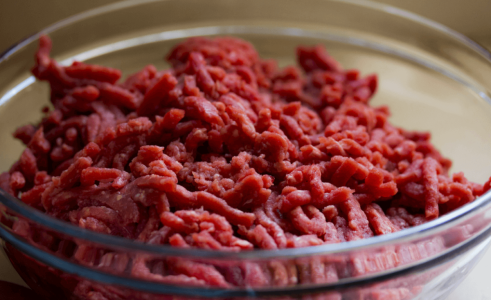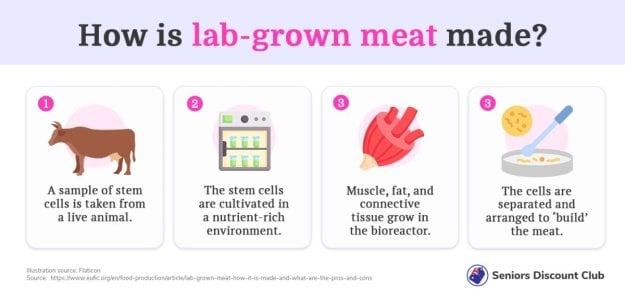Is lab-grown meat the future of food? Why it's 'inevitable', despite public concerns
- Replies 13
Turn on the television or open a newspaper these days, and there's no end to the innovative inventions that are changing the way we live our lives. One such breakthrough on the horizon is lab-grown meat, known as 'cellular agriculture'.
However, many have been raising their eyebrows and expressing doubts about embracing this science-fiction-like concept.
Recent research indicates that most Aussies don't want to eat lab-grown meat, and some even harbour concerns about its safety. But is this reluctance warranted?
At a recent conference in Sydney, experts from the tech, finance, agriculture, and academic sectors came together for the CellAg Summit to discuss cellular agriculture's future and address the industry's hard questions.

One of their main concerns is swaying the opinion of reluctant consumers because the technology could be crucial in avoiding future food crises, particularly in developing countries.
Factors such as limited arable land, unpredictable weather due to climate change, and the world's population projection of 10 billion by 2080 make lab-grown meat an appealing alternative to traditional livestock farming.
But before it can significantly impact the global food system, the technology must be scaled up, and consumer acceptance needs to improve.
So, what should you know about lab-grown meat? Here are three key insights:
1. Familiar fermentation techniques: Believe it or not, the methods used to cultivate lab-grown meat are already employed in producing various foods and beverages. Think of it as an extension of an established culinary process rather than a brand-new concoction.
2. A strong track record: Since Singapore first approved the sale of lab-grown chicken in 2020, no one has fallen seriously ill or died from consuming the product. This promising start should provide some peace of mind to worried consumers.
3. Rigorous safety standards: Australia has stringent food safety systems, meaning lab-grown meat will only appear on our shelves if it passes all the required tests.
While these facts may alleviate some concerns, the cellular agriculture sector has a long road ahead to gain public acceptance.
In Australia, experts are urging a change of perception, or the country could miss out on billions of dollars in revenue as food production evolves. Nations like the United States, China, and countries in the Middle East are investing heavily in the industry, and Australia risks being left behind if this resistance continues.
To overcome this hurdle, transparency with consumers and collaboration between producers is essential. The industry must learn from the past and avoid encountering the same challenges that faced genetically modified foods (GMOs) in the 1980s and 1990s, ultimately stalling their widespread adoption.
Protein Marketing Specialist, Megan Stanton, highlighted the importance of clear messaging and education on cellular agriculture at the conference, warning against filling the knowledge gap with misinformation or scare tactics. Proper communication and transparency will be vital in shaping consumer attitudes towards lab-grown meat.
'We really need to be very careful about getting messages right to avoid the same drama again,' she said.
While the prospect of lab-grown meat replacing traditional animal-based proteins may take some getting used to, it's clear that there's potential for it to become an essential part of the global diet.
In fact, Paul Bevan of Magic Valley, a company that has already cultivated lab-grown pork, believes it's 'inevitable' that cellular meat becomes the world's default protein. However, he also cautions, 'Don't expect it to happen anytime soon.'
This expanding industry offers environmental and ethical benefits, new business opportunities, and alternative income streams for farmers. Start-ups like Eden Brew – which partners with dairy cooperative Norco to produce cow-free milk – and Cauldron Ferm, a precision fermentation company, are building foundations for the future of food.
With investment and innovation gaining momentum in this sector, Australia could become a 'global powerhouse' in cellular agriculture. Despite its challenges – such as scaling up production and the energy-intensive nature of the process – the industry remains steadfast in its pursuit of revolutionising how we feed ourselves.
Ultimately, factors like taste, nutrition, and price will be the driving forces for consumer adoption. While lab-grown meat may sound like a concept from science fiction today, it's only a matter of time before it becomes a tangible reality on our dinner plates.

Over the years, we have witnessed remarkable progress and innovation. Cellular agriculture emerges as a potential game-changer in our pursuit of sustainable and ethical food sources.
With that in mind, what are your thoughts on lab-grown meat? Would you be willing to try it in the future, or do you prefer to stick with conventionally farmed animal meat? Share your perspectives in the comments section below!
However, many have been raising their eyebrows and expressing doubts about embracing this science-fiction-like concept.
Recent research indicates that most Aussies don't want to eat lab-grown meat, and some even harbour concerns about its safety. But is this reluctance warranted?
At a recent conference in Sydney, experts from the tech, finance, agriculture, and academic sectors came together for the CellAg Summit to discuss cellular agriculture's future and address the industry's hard questions.

In the future, consumers will need to shift towards consuming lab-grown meat. However, at present, they still hold reservations. Credit: Pexels/Angele J.
One of their main concerns is swaying the opinion of reluctant consumers because the technology could be crucial in avoiding future food crises, particularly in developing countries.
Factors such as limited arable land, unpredictable weather due to climate change, and the world's population projection of 10 billion by 2080 make lab-grown meat an appealing alternative to traditional livestock farming.
But before it can significantly impact the global food system, the technology must be scaled up, and consumer acceptance needs to improve.
So, what should you know about lab-grown meat? Here are three key insights:
1. Familiar fermentation techniques: Believe it or not, the methods used to cultivate lab-grown meat are already employed in producing various foods and beverages. Think of it as an extension of an established culinary process rather than a brand-new concoction.
2. A strong track record: Since Singapore first approved the sale of lab-grown chicken in 2020, no one has fallen seriously ill or died from consuming the product. This promising start should provide some peace of mind to worried consumers.
3. Rigorous safety standards: Australia has stringent food safety systems, meaning lab-grown meat will only appear on our shelves if it passes all the required tests.
While these facts may alleviate some concerns, the cellular agriculture sector has a long road ahead to gain public acceptance.
In Australia, experts are urging a change of perception, or the country could miss out on billions of dollars in revenue as food production evolves. Nations like the United States, China, and countries in the Middle East are investing heavily in the industry, and Australia risks being left behind if this resistance continues.
To overcome this hurdle, transparency with consumers and collaboration between producers is essential. The industry must learn from the past and avoid encountering the same challenges that faced genetically modified foods (GMOs) in the 1980s and 1990s, ultimately stalling their widespread adoption.
Protein Marketing Specialist, Megan Stanton, highlighted the importance of clear messaging and education on cellular agriculture at the conference, warning against filling the knowledge gap with misinformation or scare tactics. Proper communication and transparency will be vital in shaping consumer attitudes towards lab-grown meat.
'We really need to be very careful about getting messages right to avoid the same drama again,' she said.
While the prospect of lab-grown meat replacing traditional animal-based proteins may take some getting used to, it's clear that there's potential for it to become an essential part of the global diet.
In fact, Paul Bevan of Magic Valley, a company that has already cultivated lab-grown pork, believes it's 'inevitable' that cellular meat becomes the world's default protein. However, he also cautions, 'Don't expect it to happen anytime soon.'
This expanding industry offers environmental and ethical benefits, new business opportunities, and alternative income streams for farmers. Start-ups like Eden Brew – which partners with dairy cooperative Norco to produce cow-free milk – and Cauldron Ferm, a precision fermentation company, are building foundations for the future of food.
With investment and innovation gaining momentum in this sector, Australia could become a 'global powerhouse' in cellular agriculture. Despite its challenges – such as scaling up production and the energy-intensive nature of the process – the industry remains steadfast in its pursuit of revolutionising how we feed ourselves.
Ultimately, factors like taste, nutrition, and price will be the driving forces for consumer adoption. While lab-grown meat may sound like a concept from science fiction today, it's only a matter of time before it becomes a tangible reality on our dinner plates.
Key Takeaways
- Despite public fear, the lab-grown meat transition is essential to stop future famines and manage the growing global population.
- Lab meat has proven safe since its approval and sale in Singapore in 2020, and the technology to produce it is already used in other food manufacturing methods.
- The cellular agriculture industry in Australia must improve transparency and educate consumers to gain acceptance.
- Experts believe that taste, nutrition, and price, rather than sustainability and animal welfare benefits, will ultimately drive consumer change toward lab-grown meat.
Over the years, we have witnessed remarkable progress and innovation. Cellular agriculture emerges as a potential game-changer in our pursuit of sustainable and ethical food sources.
With that in mind, what are your thoughts on lab-grown meat? Would you be willing to try it in the future, or do you prefer to stick with conventionally farmed animal meat? Share your perspectives in the comments section below!








